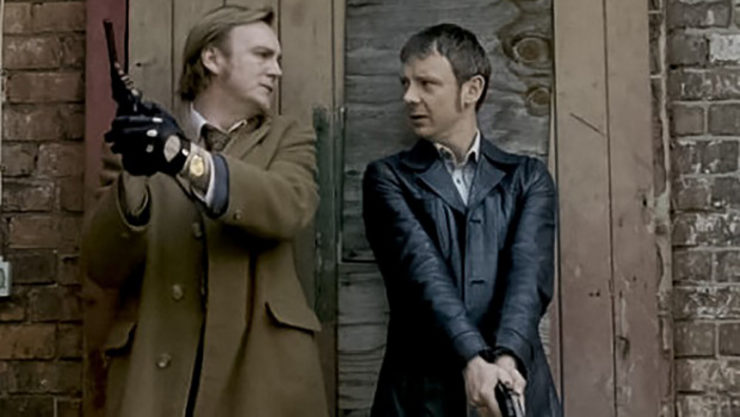The creator behind the cult series Life on Mars says that he’s in the early stages of developing a “Final Chapter” for DCI Sam Tyler, a modern-day police officer who found himself transported into 1973 after a car accident.
Spoilers ahead for both Life on Mars and Ashes to Ashes.
The series originally premiered in 2006 on BBC One, and ran for two short seasons. It starred John Simms as Sam, a by-the-books Manchester police officer who struggled to fit in with the rougher police tactics of the 1970s and with Gene Hunt (played by the fantastic Philip Glenister). The series was later adapted in the US in 2009, featuring Jason O’Mara, Harvey Keitel, and Gretchen Mol.
Over the course of show’s two seasons, Tyler contended with the vast differences in cultural differences between the two time periods, and worked to figure out what he was experiencing: had he fallen into a coma, been drugged, or actually traveled back in time? At the end of the two season run, Sam’s realities blur, and he ends up returning to the present, only to jump off a building in an attempt to return to the 1970s. The BBC reportedly considered a two-part revival special at one point, but it didn’t work out. That said, Simms noted in an interview with Digital Spy that he’d be open to reprising the role, although nobody had approached him for it.
In 2008, the series was followed up with a sequel, Ashes to Ashes, which followed another police officer, Alex Drake (Keeley Hawes), who was shot in 2008. Waking up in 1981, she’s partnered up with Gene Hunt. She knew about Sam Tyler’s situation, and goes through some of the same cultural issues between the two time periods as she tries to figure out what went wrong. What she eventually discovers is that the world that she and Sam inhabited was a sort of Purgatory for police officers, particularly ones who had died under violent circumstances. With the conclusion of that series, it seemed as though the show and world was done.
Yesterday, Matthew Graham, the writer who created the two shows, live-tweeted a screening of the first episode of Life on Mars, and wrote a bit about what to expect (via The Wertzone / Digital Spy) from the “Final Chapter” of the story, which he and co-creator Ashley Pharoah are developing.
Graham has spoken a bit about a sequel show recently. Speaking to Den of Geek in February, he explained that he had initially planned to run the series for more than two seasons, but that Simms had asked to cut it short, because he had recently become a father and was exhausted.
But since then, and because of recent events in European politics, Graham noted that he’s been “thinking and talking about something else for Sam Tyler, another journey for Sam Tyler to go on.”
It’s going to be something that’s got something on its mind about where we are now, in terms of our sexual politics, in terms of this polarization between ‘snowflakes’ and the right, and the polarization between men and women.
https://twitter.com/TremensDr/status/1230870119955517440
Over the course of his live-tweeting, Graham dropped a couple of hints about what this third series would include. Annie Cartwright (played by Liz White) would return, and that “we intend to get as many back (across both decades as we can” — something he compared to the Avengers. The show will also break with the pattern between the two earlier shows: rather than being set in the 1990s, it would be set “partially in the 70’s, partially in the 80’s and mostly in an alternate NOW,” and that it would be set in Manchester and in London, where both shows were set. The series would also be short: 4-5 episodes. He also hinted that the show would feature a TV show within a TV show format.
Graham noted that he would “never make another Mars unless we really had something to say and could push the envelop all over again. Finally we have something.”
There’s certainly plenty of material for the sequel series to cover, given the state of culture and politics right now in 2020 — both shows erred heavily on the side of social commentary, particularly in how far we’ve advanced (and at times, how little) since the 1970s and 1980s.
The big question that remains isn’t when it’ll come out or if Simms and Glennister will reprise their characters. It’s what David Bowie song will the series be named after?










